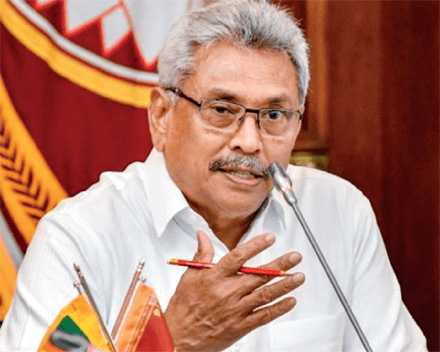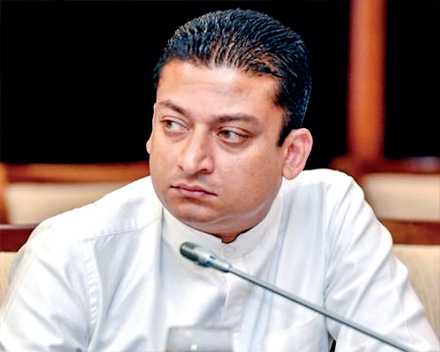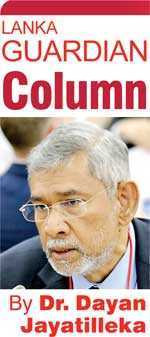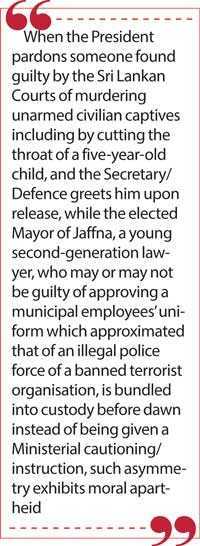Friday Feb 20, 2026
Friday Feb 20, 2026
Friday, 16 April 2021 00:00 - - {{hitsCtrl.values.hits}}

Any political leader identified with Hitler by one of his colleagues would fire that colleague and vehemently disown and denounce the reference; not so President Gotabaya Rajapaksa

Only the bitterest enemy of a political leader would associate his name with that of Adolf Hitler, the personality universally identified as the epitome of evil in modern history
 China’s Defence Minister Maj-Gen. Wei Fenghe visits Sri Lanka later this month. The former head of China’s rocket forces, he was awarded the Nishan-e-Imtiaz for promoting defensc cooperation between Pakistan and China, last December.
China’s Defence Minister Maj-Gen. Wei Fenghe visits Sri Lanka later this month. The former head of China’s rocket forces, he was awarded the Nishan-e-Imtiaz for promoting defensc cooperation between Pakistan and China, last December.
The Sinhala-Tamil New Year greeting from the Chinese Ambassador in Colombo, released in impeccable Sinhala, mentions the “strategic advice” (“upades”) on bilateral relations given by the Presidents of China and Sri Lanka in their two telephone conversations. It concludes by announcing the intention of taking the Sino-Sri Lanka “strategic partnership to a new level” in the New Year “which is a time of new beginnings”.
Invoking Hitler
Only the bitterest enemy of a political leader would associate his name with that of Adolf Hitler, the personality universally identified as the epitome of evil in modern history. Any political leader identified with Hitler by one of his colleagues would fire that colleague and vehemently disown and denounce the reference. Not so in Sri Lanka today (though it is Afro-Asia’s oldest democracy). Not so, presidential aspirant Gotabaya Rajapaksa in 2018 (Gotabaya gets an unusual compliment – The Hindu – https://www.thehindu.com/news/international/gotabaya-gets-an-unusual-compliment/article243006 77.ece). And, not so President Gotabaya Rajapaksa.
GR loyalist, State Minister Dilum Amunugama just revived the morally-warped H-word:
“The Buddhist clergy also said it is ok to be a Hitler, that is good…The 6.9 million who voted for President Gotabaya believe that he should be a Hitler of some sort…I don’t think the President likes to become a Hitler at once. But if he is pushed towards that by the actions of various sections, then he will become a Hitler, and no one will blame him. Everything will go fine then…” (Video – Sri Lankan Minister says President should become ‘Hitler’ – newsfirst.lk - https://www.newsfirst.lk/2021/04/12/sri-lankan-minister-says-president-should-become-hitler/)
When the dots are connected, are a Presidential trajectory and project indicated? There was no early warning in Myanmar, it was never an entrenched democracy and is on China’s periphery—so there’s an excuse for the world’s and the region’s democracies. In Sri Lanka’s case, all the warning lights are flashing red.
History will not absolve the global democratic community if it fails to interdict the fusion of a leap-frogging power-projection with a ‘retro-Hitler’/Myanmar project, to subtract an old democracy from the world’s democratic camp and convert it into a dependent outpost of a despotic Eastern system with an empire mentality.
If the Quad and the world’s democracies can’t beat the external-internal autocratic convergence and consolidation in Sri Lanka, an established democracy 18 miles from of a Quad member which is the world’s largest democracy, where can it succeed in defeating despotism and the blunting the offensive to change the global balance against the democratic great powers?
If the Myanmar contagion is carried to Sri Lanka, the signal will be strengthened that the democratic order is historically obsolete and the democratic powers are “paper tigers”.
Economic irrationality
Anyone old enough, who has experienced Sri Lanka’s political and social life consciously (as I have), knows in his/her bones that we’ve been here before, in 1970-1977, and this thing is either going to wind up as it did the last time, or in the (far worse) way it would have, had that Government suicidally extended its term further.
What saw us through with an average growth rate touching 5% during the long war, was a resilient, unchained private sector. The hard drive of the economy, the corporate sector, has grown and been globalised for four decades. It has also become accustomed to a certain framework of macroeconomic decision-making and consistency of conduct by the Government, which furnishes a stable macroeconomic matrix conducive for the private sector. All that is ending.
Five streams feed into the GR Government’s retro-economics:
1. The old SLFP thinking, abandoned by President Chandrika Kumaratunga and unrestored by Mahinda Rajapaksa, which damned the Open Economy of 1977 as the great Fall of a self-sufficient, i.e., involuntarily abstemious, and therefore virtuous Sri Lanka.
2. The Jathika Chinthanaya ideology of the late 1980s, and its corollary the Jathika Arthikaya project i.e., that of a ‘national economy’ (the main ideologue of which was Dr. Gunadasa Amarasekara).
3. The anti-globalisation ideology and economic nationalism of President Donald Trump.
4. A misreading of the Chinese economic achievement and the hopeless conceptual confusion of globalisation, neoliberalism and an Open Economy.
5. The ‘barracks model’ of a self-reliant command economy and a siege mentality.
Far more literate and intelligent people than today’s Cabinet and top officialdom, designed, implemented and justified the economic model of 1970-1977. The OPEC oil price hike of 1973 was the COVID-19 of that time. Though the external shock was as real as it is now, the voters rejected that as an excuse because their lived daily experience revealed that things could have been done better and differently; that their suffering was in considerable measure, policy-driven and therefore avoidable. The people were also aware that the ruling clan was hypocritical, in that its members were living a life of luxury while everyone from the middle classes downward were suffering.
The Gotabaya Government’s paradoxical policy framework—‘Ban-onomics’ (as the Daily FT Editorial has it) plus Port City—is akin to fitting one foot with a shoe that the foot has long outgrown, and the other foot with no shoe at all.
Lenin once said about the abnormal capitalism of Russia, that “we suffer not only from capitalist development but also from its insufficiency”. Sri Lanka suffers not only from interventionist overregulation (import controls, licenses) but also from the insufficiency of regulation (the Port City).
 ‘The Only Hope’
‘The Only Hope’
No wonder then that the architect of Sri Lanka’s economic revolution of 1977, Ronnie de Mel, a far more lucidly penetrating intellect than any in Government today and the most successful Finance Minister the country ever had, went on the (televised) record on his 96th birthday, insisting to Sajith Premadasa that:
“I think that the only hope for Sri Lanka to make a comeback is if you can get the whole thing going under your control and the control of policies that you represent. That’s the only hope for Sri Lanka. I will say that openly, and have said that to many people…Sri Lanka is in a dire situation…I am very fearful at times at what might happen…I hope you will be able to save Sri Lanka…I always feel that you are the only hope…”
However, the Opposition’s neoliberal ‘free-marketeers’ must digest Ronnie de Mel’s sage counsel that “socialism” must be part of the economic policy paradigm—something that President Premadasa’s son surely grasps by instinct. “What Sri Lanka needs is equitable growth,” said the wizard of the Open Economy, which is quite precisely what Nobel Prize winner Joe Stiglitz told Prime Minister Wickremesinghe and Finance Minister Samaraweera in 2015 in Colombo and was ignored, guaranteeing the UNP’s elimination five years later. (Daily Mirror – Fmr. Finance Minister Ronnie de Mel asks for more of socialism – http://www.dailymirror.lk/breaking_news/Fmr-Finance-Minister-Ronnie-de-Mel-asks-for-more-of-socialism/108-209896)
Moral apartheid
When the President pardons someone found guilty by the Sri Lankan Courts of murdering unarmed civilian captives including by cutting the throat of a five-year-old child, and the Secretary/Defence greets him upon release, while the elected Mayor of Jaffna, a young second-generation lawyer, who may or may not be guilty of approving a municipal employees’ uniform which approximated that of an illegal police force of a banned terrorist organisation, is bundled into custody before dawn instead of being given a Ministerial cautioning/instruction, such asymmetry exhibits moral apartheid.
The perception of Mayor Manivannan as a subversive threat indicates that President Gotabaya is unlikely to permit a Tamil Chief Minister and Council to hold office under the 13th Amendment.
A unilateral retrenchment by the President from the 13th Amendment will give Tamil nationalists the excuse to claim they have no alternative but to re-assert ‘the right of self-determination’.
Moreover, if the 13th Amendment no longer stands, India will have no formal commitment to Sri Lanka’s unity, sovereignty and territorial integrity, and no counterweight and constraint to resist the push from Tamil Nadu and/or from competitive geo-strategic compulsions, to tilt towards Tamil ‘self-determination’.
The purge
Meanwhile, a disturbing story appeared in the LankaCNews, the popular website (close to Minister Weerawansa), which purported to quote a mainstream newspaper, Aruna, as follows:
“Investigation by State intelligence agencies has revealed that certain prominent officials occupying top posts of state institutions are functioning under the dominance of Islamic extremist organisations. Information has been uncovered that decisions taken by the State regarding these organisations reach them through the said officials.
“The Central Bank, the Attorney-General’s Department, the Port, the airport, the Health Ministry are among the State institutions where high officials have been subordinated to the ideology of these organisations in a planned manner. It is said that among such individuals occupying high posts are professors, engineers, and computer scientists.
“A wide-ranging inquiry into places which can pose a threat to national security and those individuals occupying high posts, has been commenced by the State Intelligence Service, the Terrorist Investigation Division, the Special Police Unit and the CID.” —Aruna (lankacnews, 13 April, 3 p.m.)
Endgame scenario
The GR regime can’t use ethno-religious polarisation to permanentise a Netanyahu-type rightwing ultranationalist electoral majority, for three reasons:
1. The Sinhala majority is usually divided down the middle, and the seismic nationalist shift to the Rajapaksas was the result of the anomalous factor of the Ranil Wickremesinghe leadership of the UNP. That factor has gone, never to return or be replicated, and has been replaced by a new Opposition led by a youthful, Western-educated, populist orator with a surname that is a brand, and the war-winning Army Commander as his new party’s Chairperson.
2. The chronic, colossal economic malfunctions and mismanagement, the resultant collapse of living standards that the public (the majority of which is Sinhala) is undergoing, and the acute disaffection of the middle classes accustomed to the consumer standards of four decades of the Open Economy, almost certainly ensure a replay of the electoral fate of the 1970-1977 Bandaranaike Government.
3. Tamil discontent in the north won’t produce violent rebellion, but may produce a peaceful civic resistance (as prefigured by P2P), which if forcefully repressed by this strategically Beijing-partnered regime, would trigger pushback from the external environment, starting with the neighbourhood.
An electoral tsunami may be temporarily blocked or overturned by military intervention as in Myanmar, which will prove unsustainable despite the Beijing backstop, because:
(a) Sri Lanka is not located on China’s doorstep. Resupplying a distant island is difficult to sustain.
(b) The Tamil minority is located on India’s doorstep.
(c) China has no military assets anywhere close to Sri Lanka to offset India’s Thanjavur airbase in Tamil Nadu with its squadron of Brahmos cruise missile-carrying Sukhoi-30s.
(d) The Gotabaya regime is already sufficiently on the West’s radar to make any lunge to “be a Hitler” or “do a Myanmar”, trigger unilateral sanctions.
The Easter martyrs
The second anniversary of the Easter massacre falls next week. As a Catholic and a conflict analyst, I ponder these points: